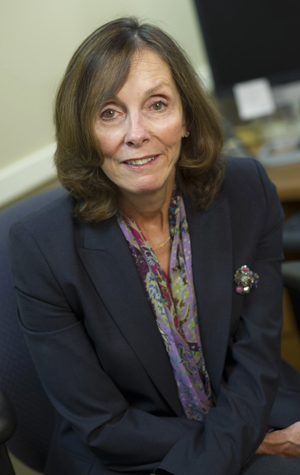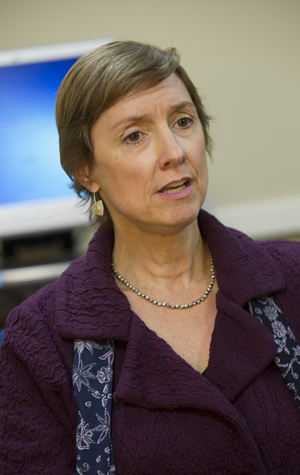When Life Gets Hard
Free counseling for employees facing a host of problems

Bonnie Jean Teitleman has had people in her office who were so “fall-down drunk” that she’s had the police rush them to the ER. Alcohol abuse by students is an all-too-familiar story, of course. But Teitleman’s inebriated visitors weren’t students. They worked for BU.
Teitleman directs the Faculty/Staff Assistance Office (FSAO), which provides University employees with free and confidential counseling and referrals for mental health problems. Fortunately, reported alcohol abuse among staffers is rare, but the office stands ready with help on that and a list of other problems spanning from depression to substance abuse to domestic violence to relationship and family issues. Oh, and that conflict you’re having with the boss.
“There are many stresses that can come up in people’s lives that can interfere with job performance,” says social worker Karen Brouhard, a FSAO counselor with expertise in domestic violence and autism. “It may be they’re dealing with caretaker issues—caring for elderly parents—or adjustment issues, relocating from another job to here.” Brouhard also has a private therapy practice and has worked with Beth Israel Deaconess Medical Center’s Center for Violence Prevention and Recovery.
We asked Brouhard and Teitleman, also a social worker, to give a conversational guided tour of the office’s services.
BU Today: Student substance abuse is well-documented. But how many staff and faculty have substance abuse problems?
Teitleman: I hear a lot about it unofficially, but we don’t get many referrals for drug and alcohol abuse.
Because people don’t want to come forward?
Teitleman: I think so. But I hear about people going to parties and seeing faculty members drunk and carrying on. Whether people seek treatment some place away from their employment—which I suspect may be the case—when we hear about it, we deal with it. I’ve seen a couple of people with alcohol problems.
How many staff and faculty know that you exist?
Teitleman: That’s a good question. People learn about us when they come to new employee orientation, but I think often, if it’s not a need at the moment, they can kind of gloss over it. But I’ve been here 15 years, and utilization has gone up fivefold. It was 300 a year 15 years ago. It’s now 1,500 to 1,700.
What do those folks come in for?
Teitleman: Probably 50 percent of the people that we see have work-related problems: “I’m overworked, I’m bored at work, I’m not challenged at work, I don’t get along with my colleagues, I’m being bullied at work.” For the other half, there are probably two reasons we see people. One is for depression/anxiety, the other is relational—marital problems, romantic problems. Periodically, we’ll feel as though there’s a wave of people who will come in with their first broken heart.

In the case of domestic violence, for example—do you have all the counseling resources here to handle that?
Brouhard: If someone has a problem that we can address with short-term counseling, we are able to do that. If it’s something that’s going to need long-term counseling or medication or anything medical, that’s something that we don’t have the capacity to provide.
Teitleman: A lot of the 1,500 annual clients we refer off-campus for help.
Brouhard: That includes private therapists, domestic violence shelter programs.
Teitleman: But a lot of problems don’t require long-term intervention. They can be addressed in a single session, sometimes three or four sessions.
What are the advantages of getting help here as opposed to going off-campus?
Teitleman: We know the organizational culture here, we know what kinds of behaviors work and don’t work. We understand how Human Resources works. We understand the disciplinary procedure. We’re confidential; if somebody complains about their supervisor, we don’t call the supervisor.
We can see you before you start work in the morning, at lunchtime, during your afternoon break.
Brouhard: It’s often a question of, is this a problem that’s external—my work environment, the people I work with? Or is it internal—something I’m going through personally? With our knowing the environment here, I think we’re better able to help people work that out. Is it the type of situation to involve the ombuds? An outside provider might not know about the ombuds or what the resources are here.
A supervisor might be confronted with an employee who is very impaired and not know how to handle that or where to get them help. We are able to help them find the resources or directly help the employee find the resources.
Do you find that because of their education, people at the University are more aware of pitfalls and more willing to seek help with problems?
Teitleman: Sometimes, people who are very well educated and have a sense of how smart they are can be difficult to treat because of their sense of superiority.
Brouhard: And there are probably more staff than faculty here, so a lot of employees don’t necessarily have PhDs. I couldn’t say domestic violence is as prevalent in higher-educated groups, but I certainly have seen many highly educated people who are dealing with controlling relationships. There’s lots of abuse that’s emotional, psychological.
Make an appointment at the Faculty/Staff Assistance Office here.

Comments & Discussion
Boston University moderates comments to facilitate an informed, substantive, civil conversation. Abusive, profane, self-promotional, misleading, incoherent or off-topic comments will be rejected. Moderators are staffed during regular business hours (EST) and can only accept comments written in English. Statistics or facts must include a citation or a link to the citation.